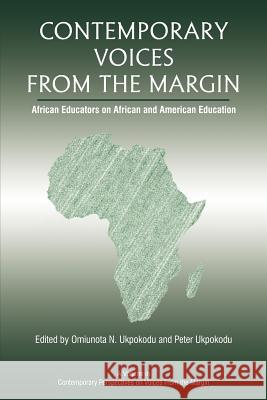Contemporary Voices from the Margin: African Educators on African and American Education » książka
Contemporary Voices from the Margin: African Educators on African and American Education
ISBN-13: 9781617357954 / Angielski / Miękka / 2012 / 386 str.
Traditionally, American educators and communities have looked to Europe and Asia for ideas for rethinking and reforming education for America's diverse children. This book, Contemporary Voices from the Margin: African Educators on African and American Education, brings together new voices of diverse African-born teacher educators and Africanist scholars who share personal experiences as well as research based perspectives about education in Africa and America that will be valuable to rethinking and reforming education for America's struggling schools. The book is a comprehensive work of experienced educators and scholars in the field of teacher education and African Studies. The editors of the book invited a diverse group of African-born teacher educators and scholars from different countries of Africa who teach in the U.S. The contributors share a common African experience, but they are geographically diverse in countries of origin and research. Their knowledge about African communal living as well as colonial powers and imperialism as they operated in various African countries enables them to compare and contrast various educational models and practices, including traditional ones. They are also diverse in their fields of specialisation but have expertise in multicultural education, urban education, and culturally responsive pedagogy that have become the focus of U.S. discourses in public education and teacher preparation programs. Given that these scholars were born or socialised, and educated in, as well as, taught schools and colleges in their respective African countries before settling in the United States, they bring a wealth of experience and insights into what it means to successfully educate children and youth. The book is divided into three parts. Part 1 examines African processes and practices of education, both formal and informal, as contributing authors share perspectives about African indigenous education including cultural socialisation and formal western-type education and organisation of schools. Part 2 focuses on patterns and structures of formal, western-type education in selected African countries. Part 3 explores cross-cultural perspectives on American education. The contributors provide chapters of stimulating and rich perspectives that will engage the discourse on rethinking and reforming education and schooling for America's diverse students. CONTENTS
Introduction: Voices and Insights on Contemporary Education, Omiunota N. Ukpokodu and Peter Ukpokodu. African Indigenous Education: Formal and Informal, Peter Ukpokodu. African Education Through the Arts, Akosua O. Addo. African Traditional Education and Citizenship Development, Lewis Asimeng-Boahene. Islamic Cultural Socialization and Education in Nigeria, Omiunota N. Ukpokodu and Beverly Mack. Children and Cultural Socialisation Across Two Nations (Kenya and the U.S.), Lydiah Nganga. Perspectives on K-12 Learning and Teacher Preparation in East Africa, Teresa A. Wasonga. Harambee Populism, Social Change, and Modern Education in Kenya, Alfred T. Kisubi. Perspectives on Public Education in Kenya and the U.S., Lydiah Nganga and John Kambutu. Disability Within the African Culture, Michael Eskay. Cultural Socialization and Primary Educational Perspectives in Three East African Countries, Mary Oling-Sisay. Transformative Leadership at the Starehe Boys' Centre and School in Kenya, Peter O. Ojiambo. Educational Transformation in South Africa, Peter Ukpokodu and Omiunota N. Ukpokodu. A Comparative Study of U.S. Inner-City and Kenyan Rural and Slum Schools, Alfred Taligoola Kisubi. African-Born Teachers' Perspectives about American Urban Education, Omiunota N. Ukpokodu. Seeing, Teaching, and Leading in an American Urban Public School, Martin Ngom. Preparing Teachers for Diversity Education in a "Lily-White" Community, John Kambutu and Lydiah Nganga. About the Contributors.











